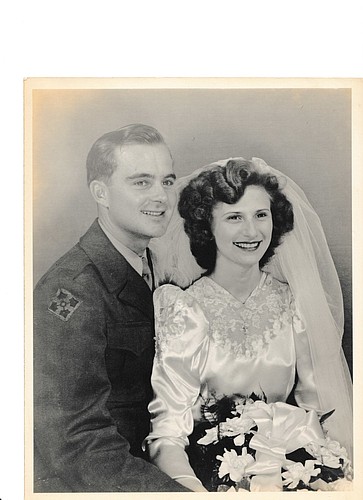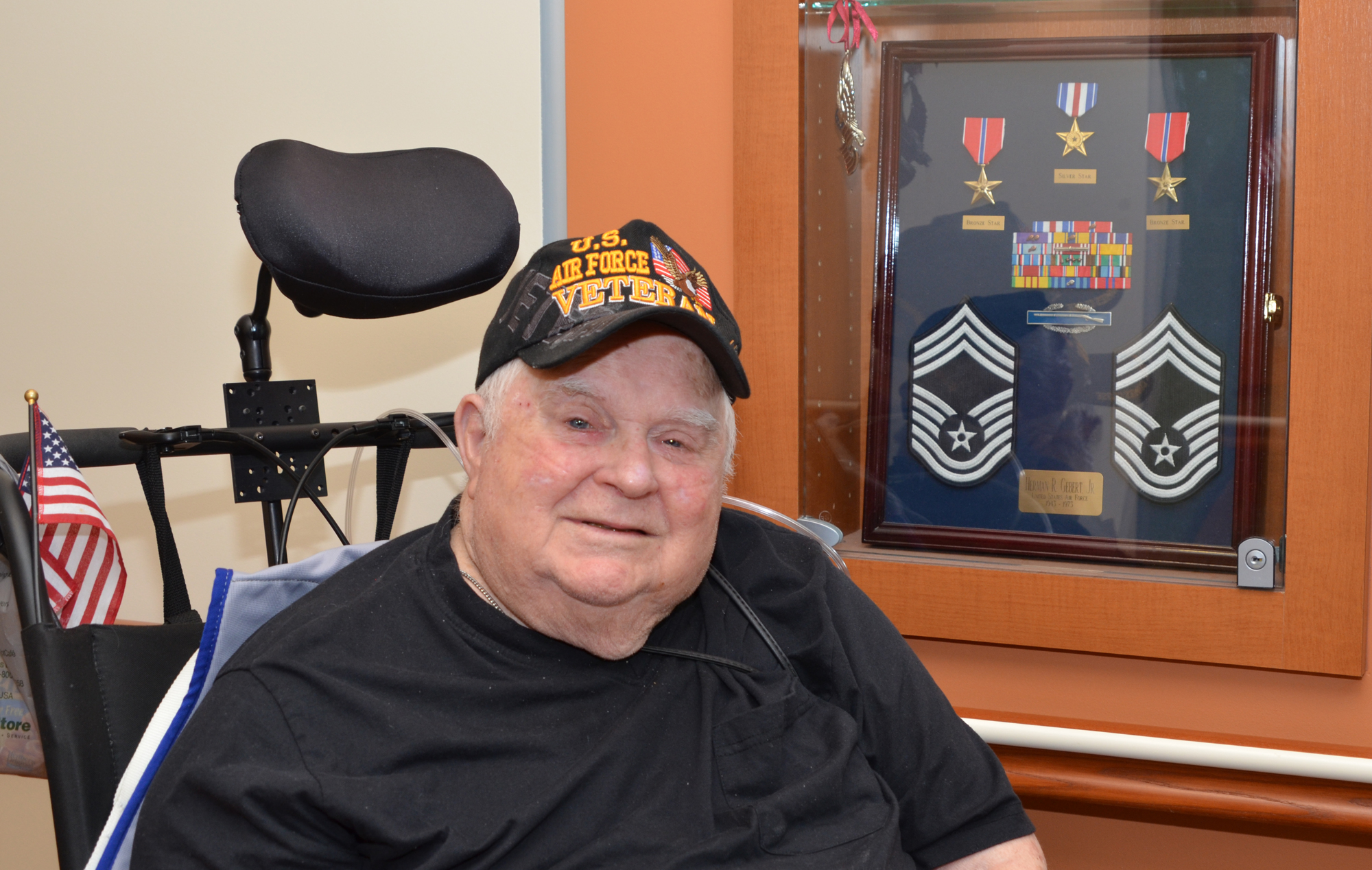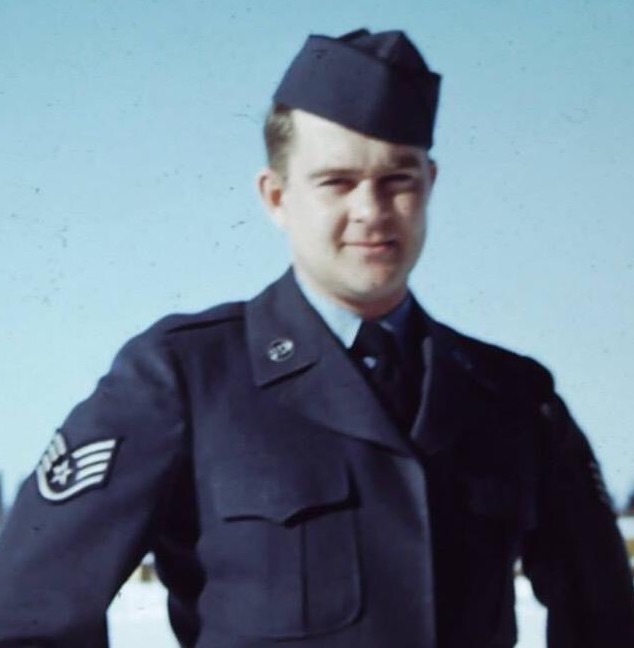- April 26, 2024
-
-
Loading

Loading

Herman R. Gebert Jr. was never comfortable accepting all the medals and awards he received for his participation in the European Theater during World War II. It has always bothered him that he was honored for doing his job — and for taking the enemy's life.
Gebert, now 92 and a resident of the Orlando Veterans Affairs Community Living Center at Lake Nona, still has difficulty talking about some of the experiences he lived through.
He has taken a bullet to his hand and his backside. He has eliminated a German foxhole on Omaha Beach. He has escaped German soldiers by jumping off a bridge into a freezing and fast-moving river. He has taken lives, and he has saved lives.
18 AND DRAFTED
Gebert was born and raised in Fort Lauderdale and spent many teenage summers as a beach lifeguard, a skill that would later save his life.
He was drafted into the U.S. Army Air Corps in 1942 at age 18. He trained at Camp Blanding in north Florida and then went to Little Falls, Minnesota, for tests, where it was determined he was a good candidate for linguist training.
Gebert was assigned to the 4th Infantry Division, 22nd Infantry and boarded the Queen Mary for Europe. He took a three-week crash course in the French language at the University of Oxford before attending the University of Cambridge for two weeks to learn how to be a Frenchman.
From there, he and a few other liaisons were sent to France to make contact with the French underground to coordinate plans for Operation Overlord (the code name for the Battle of Normandy).
EARNING HIS MEDALS
The first of two Bronze Stars were earned when Gebert and another soldier, dressed as French civilians, were captured in the winter of 1944. A German patrol captured the two “suspicious Frenchmen,” but the snowy and windy conditions made it easy to escape at dusk.
They ran and were shot at by the Germans; the second soldier was struck but able to continue running, and the two hid in a snow bank until the opposition was gone. Gebert carried his comrade on his back for several miles to a farmhouse, unaware that his partner had died.

He also earned a Silver Star and a Purple Heart for his role in D-Day, but his two daughters didn’t hear any details until recently.
After completing his reconnaissance with the French underground in preparation for the Allied invasion of the French region of Normandy on June 6, 1944, Gebert and thousands of other soldiers trained and waited for the D-Day invasion.
They spent several days crowded into landing craft on ships being transported from Southampton to Dartmouth. At dawn on June 6, the 4th Infantry Division rushed the shoreline of Utah Beach. While Gebert will not talk about the initial landing, he has shared that around this time, in the battle for Sainte-Marie-du-Mont, the first village liberated on D-Day, he was shot in his left hand.
He was triaged at a nearby church and then sent to a hospital ship off the coast. A few days later, he and several other men were cleared to return to their battalions.
Their arrival on Omaha Beach and attempt to scale the hills and cliffs was met with heavy gunfire. Trapped, Gebert reached for a pile of rifles that had been collected from dead soldiers, charged up the hill and started throwing grenades and firing until no one fired back.
He said he didn’t expect to survive but was concerned about getting the rest of the men to safety. The medals he received were for risking his own life to save theirs.
Gebert earned his second Bronze Star and second Purple Heart following D-Day, when Germans captured him and five other soldiers in Belgium. Because of their work with the French underground, Gebert and a Maj. Vogel were to be turned over to the Gestapo. They devised a plan, and as the six were being marched to a prisoner-of-war location, assisted by a German squad a few hundred yards back, they waited until they were over the Meuse River and then killed the front and back guards and jumped off the bridge.
As he dived into the frigid water, Gebert was shot in the buttocks.
Vogel swam to shore; Gebert, putting his lifeguarding skills to work, saved three of the men but was unable to locate the other.
After reaching Allied lines, Gebert returned to England to be treated for an infected bullet wound and pneumonia.
He said it has always bothered him to be rewarded for these incidents because he had to take the lives of several men and failed to save another.
Gebert earned his third Purple Heart when his group was being transported on a troop train in England in the middle of the night and the train was struck by a German bomber. The men jumped off the train, and Gebert broke several bones in both feet. Medics wrapped them up, and he returned to duty.
MULTIPLE BATTLES
Even today, there are some parts of World War II that Gebert simply cannot talk about with anyone. He served in the Battle of the Bulge (the Ardennes Offensive) and, more specifically, the Battle of Hurtgen Forest, in Germany, where two out of every three soldiers were killed. He said he was one of the few who went in and actually came out of this small but definitive battle.
He participated in the Battle of Saint-Lo and the liberation of Cherbourg, as well.
AFTER WORLD WAR II
Gebert spent many months recovering in an English hospital; his pneumonia would be an issue his entire life.
He returned to the United States in 1945, bringing with him an issue called chronic post-traumatic stress disorder that wouldn’t be diagnosed for 60 years.

In 1946, Gebert accompanied a buddy to a train station in Fort Lauderdale. The friend was meeting his fiancée, Alice, who brought her cousin Charlotte Lotz as a chaperone. Gebert and Lotz hit it off and went to the beach the next day and every day thereafter for two weeks. Before she returned home to New York, he promised to go up there in six weeks and marry her. And he did.
The couple returned to Florida, where he was stationed.
In 1947, he received an enlistment into the newly formed U.S. Air Force and trained to be an air-traffic controller, which is what he did for most of his military career.
He was stationed in Galena, Alaska, during the Korean War, monitoring the Aleutian Islands for activity from 1949-51.
During the early days of the Vietnam War, his job was to survey the landscape and determine where to set up radar sites. He was based in Danang, Saigon and Nha Trang. He said he didn’t escape danger there either, taking a bullet to the front of his metal helmet.
He also developed type 2 diabetes from sitting on cases of Agent Orange, the controversial herbicide used to defoliate jungles, when they were being delivered by air. The U.S. Department of Veterans Affairs includes type 2 diabetes on the list of diseases associate with Agent Orange.
Gebert’s final assignment of his military career was as a member of the Inspector General’s team for the western U.S. responsible for aircraft towers and radar approach control facilities.
He retired from active duty in 1969 as a chief master sergeant and remained on reserve duty for another three years, having served for a total of 30 years.
Gebert and his wife were married for 66 years and lived for many years in Ocoee and the Dr. Phillips area; she died in February 2013. They have two daughters, Linda Bethke and Diane Magill-Davis; seven grandchildren; 14 great-grandchildren; two great-great-grandchildren; and many step-grandchildren.
Contact Amy Quesinberry Rhode at [email protected].